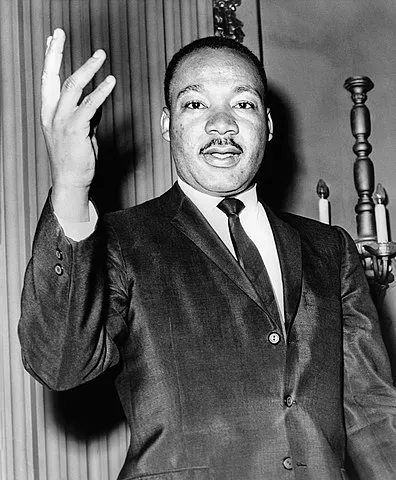Martin Luther King, one of the most celebrated figures in history, remains a symbol of hope, equality, and perseverance. Known for his pivotal role in the American civil rights movement, King’s unwavering commitment to justice and nonviolence reshaped societal norms in the United States. Nearly six decades after his death, King’s legacy continues to inspire movements for change worldwide. This comprehensive biography sheds light on Martin Luther King Jr.’s early years, education, career highlights, personal struggles, and lasting impact.
Early Life and Family
Martin Luther King Jr. was born as Michael Luther King Jr. on January 15, 1929, in Atlanta, Georgia, to Michael King Sr. and Alberta Williams King. His father, a Baptist minister, later adopted the name Martin Luther King Sr. in honor of the Protestant reformer Martin Luther, prompting his son to follow suit. The middle child of three siblings, King grew up with his older sister, Christine, and younger brother, Alfred Daniel.
King’s family lived in Atlanta’s bustling Auburn Avenue community, known as “Sweet Auburn,” a prominent hub for African American culture and business. Raised in a middle-class, devoutly Christian household, King experienced both a loving environment and the harsh realities of racial segregation. His father’s staunch opposition to injustice instilled in him a lifelong commitment to fighting inequality.
Upbringing and Education
A precocious child, Martin Luther King’s entered school at the age of five and exhibited academic promise. At Booker T. Washington High School, he skipped both the ninth and eleventh grades and enrolled at Morehouse College at just 15 years old.
King’s early ambitions were unclear; he initially explored law and medicine as potential careers. However, his experiences with systemic racism and his father’s influence prompted him to join the ministry. Mentored by Morehouse College President Benjamin Mays, a noted advocate for social justice, King graduated with a degree in sociology in 1948 and proceeded to Crozer Theological Seminary in Pennsylvania.
At Crozer, King excelled academically, becoming student body president and graduating as valedictorian in 1951. He later earned a doctorate in systematic theology from Boston University in 1955. During his studies in Boston, King met Coretta Scott, whom he married in 1953. Together, they had four children—Yolanda, Martin III, Dexter, and Bernice.
Career Highlights and Activism
Early Ministry and Montgomery Bus Boycott
Upon completing his doctorate, Martin Luther King’s became the pastor of Dexter Avenue Baptist Church in Montgomery, Alabama, in 1954. His rise to national prominence began shortly afterward with the Montgomery Bus Boycott in 1955. Triggered by Rosa Parks’ arrest for refusing to give up her bus seat to a white passenger, the boycott symbolized the civil rights movement’s resolve to dismantle segregation. King’s leadership throughout the 381-day protest demonstrated his eloquence, organizational skills, and commitment to nonviolence.
Southern Christian Leadership Conference
Following the boycott, King co-founded the Southern Christian Leadership Conference (SCLC) in 1957, an organization dedicated to achieving equality through nonviolent resistance. Through the SCLC, King orchestrated numerous protests, including the 1963 Birmingham Campaign, which brought national attention to the brutality of racial discrimination.
“I Have a Dream” Speech and March on Washington
King’s most iconic moment came on August 28, 1963, during the March on Washington for Jobs and Freedom. Speaking before 250,000 attendees at the Lincoln Memorial, his famous “I Have a Dream” speech called for racial harmony, equality, and justice. The speech remains one of the most influential addresses in U.S. history.
Civil Rights Act and Nobel Peace Prize
King’s activism contributed significantly to the passage of the Civil Rights Act of 1964 and the Voting Rights Act of 1965, two landmark pieces of legislation that dismantled institutional racism. Recognizing his efforts, King was awarded the Nobel Peace Prize in 1964, becoming the youngest recipient at the time.
Selma-to-Montgomery March
The Selma-to-Montgomery marches in 1965 further cemented Martin Luther King as a symbol of nonviolent resistance. Television coverage of the violent response to marchers on “Bloody Sunday” galvanized public opinion, leading to the passage of the Voting Rights Act later that year.
Personal Struggles and Challenges
While Martin Luther King is celebrated as a visionary, his life was not without hardship. He endured arrest more than 30 times for his activism, faced constant surveillance by the FBI under J. Edgar Hoover’s leadership, and received death threats throughout his career. King also struggled with bouts of depression and immense pressure as the face of a movement. Despite these challenges, he remained steadfast in his mission.
Assassination and Legacy
On April 4, 1968, tragedy struck when Martin Luther King’s was assassinated on the balcony of the Lorraine Motel in Memphis, Tennessee. His death at age 39 sent shockwaves across the nation, sparking riots and mourning. The suspected gunman, James Earl Ray, was apprehended and convicted.
King’s legacy endures through the annual observance of Martin Luther King Jr. Day, established as a federal holiday in 1986. The day serves as a reminder of his profound impact and commitment to justice. Memorials, schools, and streets bearing his name further honor his contributions.
Net Worth and Memorabilia
While Martin Luther King’s lived modestly, relying on his pastor’s salary, his speeches, letters, and memorabilia are priceless treasures that continue to inspire.
| Key Details | Information |
|---|---|
| Full Name | Martin Luther King Jr. |
| Birth | January 15, 1929, Atlanta, Georgia |
| Death | April 4, 1968, Memphis, Tennessee |
| Occupation | Baptist Minister, Civil Rights Activist |
| Spouse | Coretta Scott King |
| Children | Yolanda, Martin III, Dexter, Bernice |
| Height | Approx. 5’7” |
| Weight | Approx. 165 lbs |
| Notable Works | “I Have a Dream” speech, March on Washington |
| Nobel Peace Prize | Awarded in 1964 |
Martin Luther King’s Enduring Influence
Today, Martin Luther King’s remains a beacon of inspiration for social justice movements worldwide. His philosophy of nonviolence, rooted in Christian beliefs and influenced by Gandhi, underscores the power of peaceful resistance. The 2025 Martin Luther King Jr. Day events, including prayer breakfasts and educational programs, continue to emphasize King’s timeless message.
FAQs about Martin Luther King
What Happened to Martin Luther King?
Martin Luther King Jr. was assassinated on April 4, 1968, in Memphis, Tennessee, at the Lorraine Motel.
What Are 5 Facts About Martin Luther King?
- He was a civil rights leader.
- He won the Nobel Peace Prize in 1964.
- He delivered the famous “I Have a Dream” speech.
- He was born on January 15, 1929.
- He was a Baptist minister.
When Was Martin Luther King Born and Died?
Martin Luther King Jr. was born on January 15, 1929, and died on April 4, 1968.
What Did Martin Luther King Fight For?
Martin Luther King Jr. fought for civil rights, racial equality, and an end to segregation in America.
What Did Martin Luther King’s Do?
He led the civil rights movement, organized nonviolent protests, and advocated for equal rights through peaceful activism.
How Did Martin Luther King Change the World?
He inspired global movements for civil rights, contributed to ending segregation, and helped achieve the Civil Rights Act of 1964.
What Is Martin Luther King Famous For?
He is famous for his leadership in the civil rights movement and his “I Have a Dream” speech.
What Religion Was Dr. Martin Luther King Jr.?
Dr. Martin Luther King Jr. was a Baptist Christian minister.
Final Thoughts
Martin Luther King Jr. transformed the moral fabric of the United States through his unwavering dedication to justice, equality, and nonviolence. His vision of a “beloved community” continues to guide efforts to eradicate racism, poverty, and inequality. Though King’s life was cut short, his legacy endures, inspiring future generations to strive for a more just world.

